Audrain, LeMay, Petersen, and Other Museums Embrace Japanese Cars—Finally!

Blame the Fast and the Furious.
Japanese cars were long regarded as mere appliances. The first ones on our shores were underpowered and often lacking quality. Then, when the OPEC oil embargo came, they were suddenly in great demand.
It was at that point that many buyers realized Japanese cars offered a level of efficiency and quality that was simply not present in “domestic” models. That only increased, with greater and greater quality and reliability, not to mention gas mileage.
Then performance became part of the Japanese car guarantee. Think of the Mazda RX-7, the Toyota Supra, and the Nissan GT-R, to name a few. There was a time when the entire Escort Endurance World Challenge series was nothing but Honda Civic CRX Si hatchbacks screaming around race tracks across America like angry bees.
But recognition for advances in Japanese autos was slow to come, at least outside a small cadre of enthusiasts. That is changing.
Current major exhibits at the Audrain Automobile Museum, the LeMay and several past exhibits at the Petersen Automotive Museum celebrate the passion of Japanese cars for more than just good gas mileage and the fact they start every time you turn the key or push the button.
“This exhibition takes us to a place we’ve never been before,” said Donald Osborne, CEO of the Audrain Automobile Museum in Newport, Rhode Island, of the new exhibit, JDM and Beyond: The Worldwide Influence of Japanese Automobiles.

“The worldwide passion for Japanese cars is something which we all accept today. This exhibition seeks to explore, in a very small way… how the Japanese carmakers moved from the manufacturers of very small, generally utilitarian cars closely copied on European examples, to some of the most cutting-edge technology and a feeling of passion that has been captured worldwide for Japanese cars and motorcycles,” said Osborne.
That exhibit, which opened in March and runs through June 9, is the first such showing at the Audrain in the museum’s history. It runs the gamut of Japanese cars, from a humble and goofy 1970 Subaru 360 to a 1988 McLaren-Honda MP4/4 that won 15 out of 16 races in 1988 and still holds the record for the highest percentage of laps led in a season at 97.3% (it would have won 16 out of 16 if Jean-Louis Schlesser hadn’t sliced Ayrton Senna out of the lead at Monza, but that’s another story).
“Over half the cars in the exhibit are loans, things we don’t have in our collections. Yet. We will,” said David Demuzio, executive director and chief curator for the Audrain: “It’s a new genre for us and I think it’s going to bring in a really exciting demographic that we don’t often see here at the museum.”
The LeMay Museum in Tacoma, Washington, has just opened Shinka: An Immersive Japanese Automobile Exhibit.
“This one-of-a-kind exploration of Japan’s automotive heritage will offer visitors unparalleled access to some of the most iconic and important vehicles to come out of Japan,” the museum said.
“The display will feature everything from classic models that laid the foundation of the Japanese automotive identity, to legends of the ‘90s and their modern-day successors, providing museum guests with the opportunity to witness their distinct engineering and aesthetics up close.”
The exhibit is open for a year, with new cars rotated throughout that time.
The Petersen Automotive Museum in Los Angeles hosted the exhibit “Creative Spirit in Japanese Automaking” from 2018 to 2019 and hosts an annual Japanese Cruise-In that often overwhelms the four-level parking structure and surrounding streets.
The California Automobile Museum in Sacramento hosted Japanese cars at an exhibit it called The Automotive Side of Japan.

Nisan has been a featured marque at The Mitty and at the Rolex Monterey Motorsports Reunion, the latter which will have a 1988 Nissan GTP ZX-Turbo as one of its 50th anniversary race cars this August.
The elegant La Jolla Concours featured Japanese classics when it ran last month.
The Japanese Classic Car Show in Long Beach, California, will celebrate its 19th year this fall, and the Toyotafest is set for June 8, both at Marina Green Park in Long Beach. And just off the main lobby at Honda’s U.S. headquarters in Torrance, Calif., is the all-new and open-to-the-public American Honda Collection Hall to buttress the American Heritage Center in Marysville, Ohio.

Just before dawn the cars begin rolling out of the Long Beach Arena parking lot, across Shoreline Drive and onto the damp grass of Marina Green Park. This ‘73-ish Toyota Celica GT seems happy to be out of the garage.

A first-gen '89-'94 240sx with a Silvia S13 front end conversion fires up. So many of these are turned into doriftu cars.
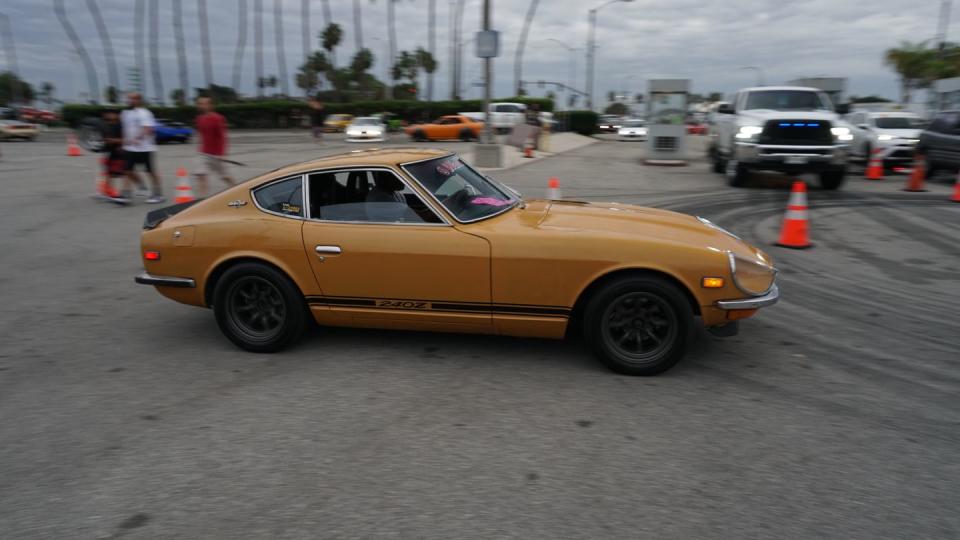
The Datsun 240Z was produced from 1969 to 1973, with a 2.4-liter (duh) SOHC straight-six making 151 hp.

It was followed by the 260Z, which was made from 1974 to 1978 with a larger, 2.6-liter six, but emissions regulations cut power to 139 hp.

As gray as the clouds that hung over the show.

The Toyota AE86 remains one of the most sought-after drift and performance cars on the market.
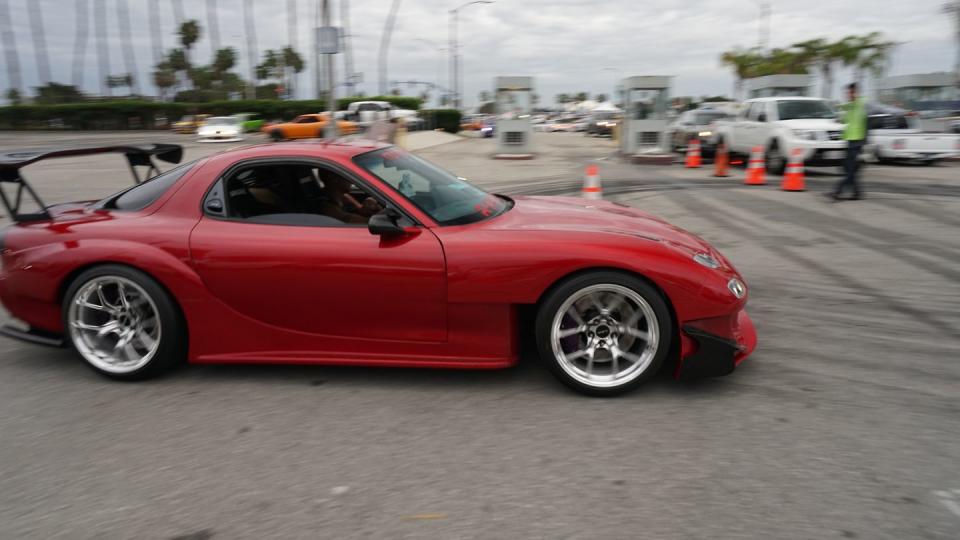
This third-gen Mazda RX-7 looked cool. That generation had a turbocharged 13B-REW rotary making 252 hp in 1992 and 276 hp by the time production ended in Japan in 2002.

Another AE86, AKA Toyota Corolla.
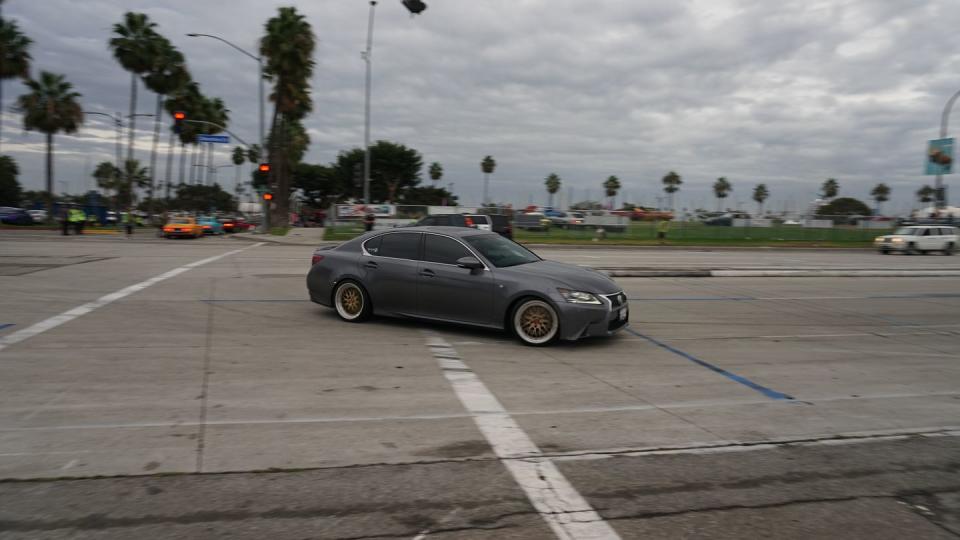
Lexus GS 350 F Sport goes looking for parking.

Datsun 240Z.
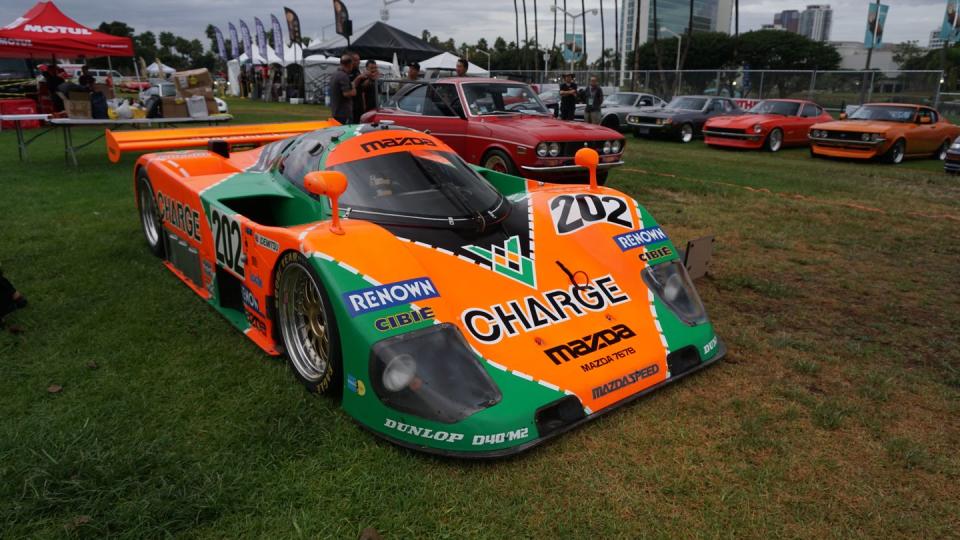
1989 Mazda 767B. Mazda was one of three manufacturers with a corporate presence at the show. The 767B won its class at Le Mans in 1990. One of the three built sold at Gooding & Co. in 2017 for $1.75 million.

A total of 1176 rotary powered Mazda Cosmos were produced from 1967 to 1972. The engines made 110 hp in Series I configuration and 130 hp in Series II.

Abel Ibrarra was one of the front runners of the Import Drag Racing Scene in the '90s, racing various Mazdas. His team was called El Pollo Flaco, or the Skinny Chicken. This RX-2 is his daily driver.

1990 Toyota Cressida.

Big Mike Muniz bought this 1967 Toyota Publica at a government auction, gave the stock engine to Terry Yamaguchi, and swapped in a Suzuki Hayabusa engine. Gas tank from the 'Busa is in the trunk. Hand-operated clutch from the Hayabusa is on the stick shift. "How come you're not working for, like, NASA or somethin'?" I asked. "I work at Rivian," he said.

That's the Hayabusa gas tank in the trunk of the Publica.

...and this is the 'Busa block in the Publica.

1981 Toyota Starlet, in white, 1982 Toyota Starlet in blue.

Our friend Jon Seidel wheeled this vintage Yamaha onto the grass.

These Hondas were both converted to cabriolets by Straman.

The Suzuki Samurai is highly capable off-road.

Justin Hernandez' 1992 Honda Civic Si.

Spoon Sports is a tuner specializing in Hondas and Acuras.

This is the only known photo of organzier Koji Yamaguchi during setup time for the Japanese Classic Car Show.

The Honda N360 was produced from 1967 to '72. It was followed by the N600. From this humble beginning came the mighty Honda we know today.

The Honda ACTY came in microvan and pickup truck configuration and was made up until last year.

The Petersen Automotive Museum in Los Angeles brought this Toyota Mirai hydrogen fuel-cell vehicle. The wrap on it can be drawn on by children and others. The museum has many other Japanese cars, including an FD RX-7 prototype, '96 Mitsubishi 3000 GT VR4, Honda N600, 1980 Nissan ZX, 1965 Toyota Crown, and even a left hand-drive 1965 Nissan Cedric, but none of those were ready to take on the Long Beach freeway. Go visit the Pete at petersen.org. It's an amazing place, with new exhibits all the time.

At first I was drawn to this 1973 240Z because of its Rocket Bunny wheel arches. When I asked whose it was I got a few giggles, then I noticed Sung Kang behind a curtain. It didn't look like he was coming out. Brandon McGrath, general manager of Kang's clothing line Student Driver, came out. He said the car was built in 2015 and displayed at the SEMA show. It even had a bit part in F&F 9. The car is powered by a naturally aspirated RB 2.6-liter straight-six. It looked cool, very well-integrated all around.

There were many Acura NSXs on hand...
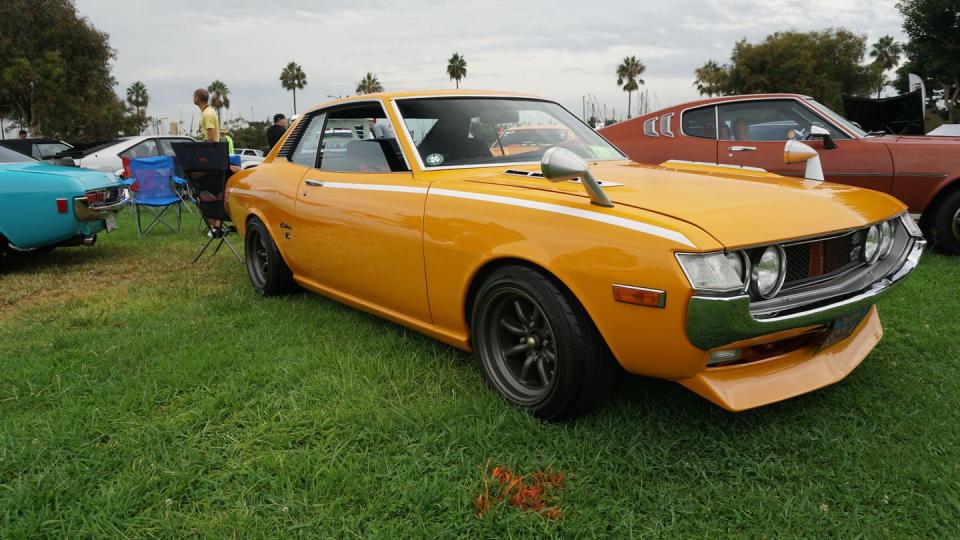
...as well as Toyota Celicas. This is a '72 Celica GT.

1991 Toyota Land Cruiser.

Erick Aguilar stands behind his work, a 1971 Datsun 510 he built for Sung Kang. The car has a Honda S2000 engine, a 280ZX transmission, along with coilovers and just about everything else. "It drives beautifully," he said.
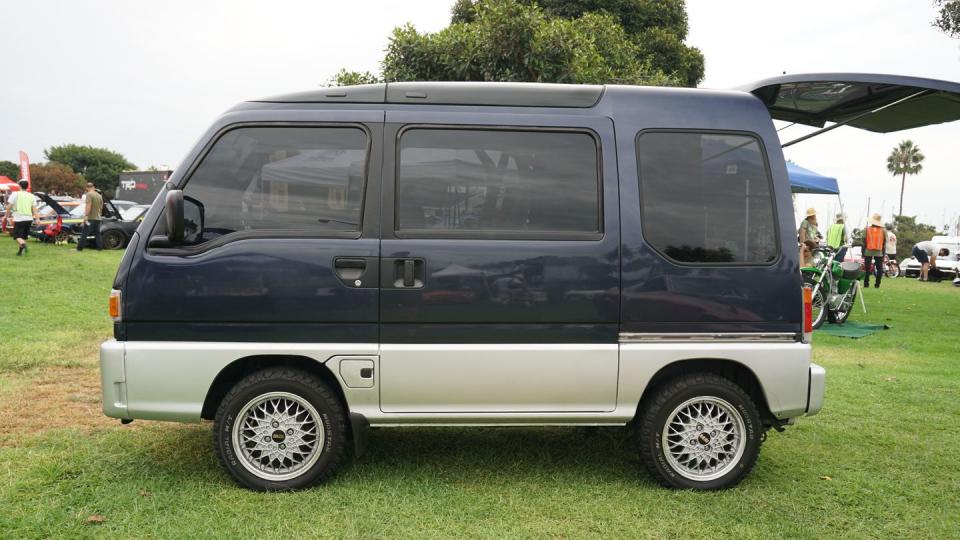
Subaru Sambar kei-class van. So cute.

More vintage bikes!

As you read this there is a group traversing Mongolia—I am not making this up, Mongolia! On Honda Monkeys. You can follow them at www.theadventurists.com/monkey-run/

1986 Toyota Corolla AE86.

Motul gave out several awards at the show.

1979 Toyota Cressida.
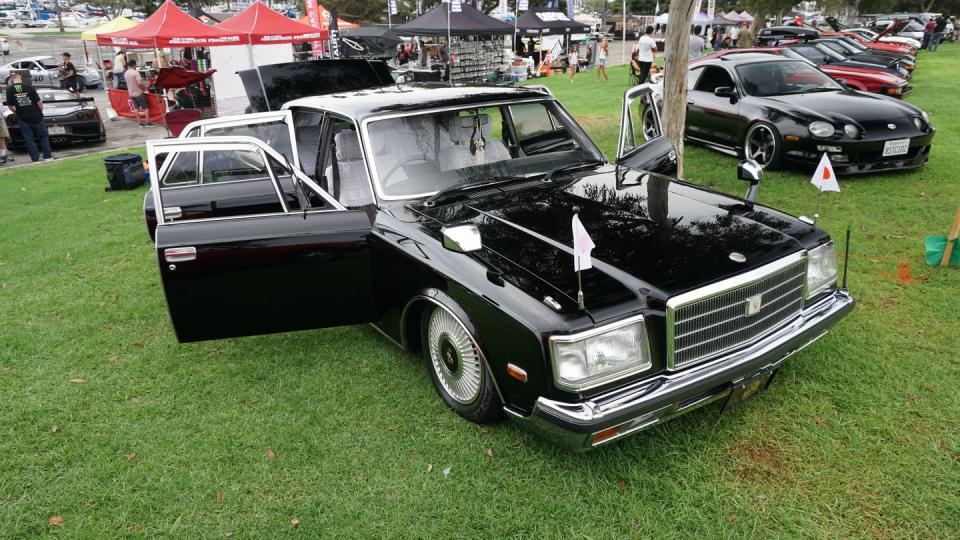
This 1991 Toyota Century is for sale.

More motorcycles! These were brought by the Trailblazers Motorcycle Club, trailblazersmc.com.
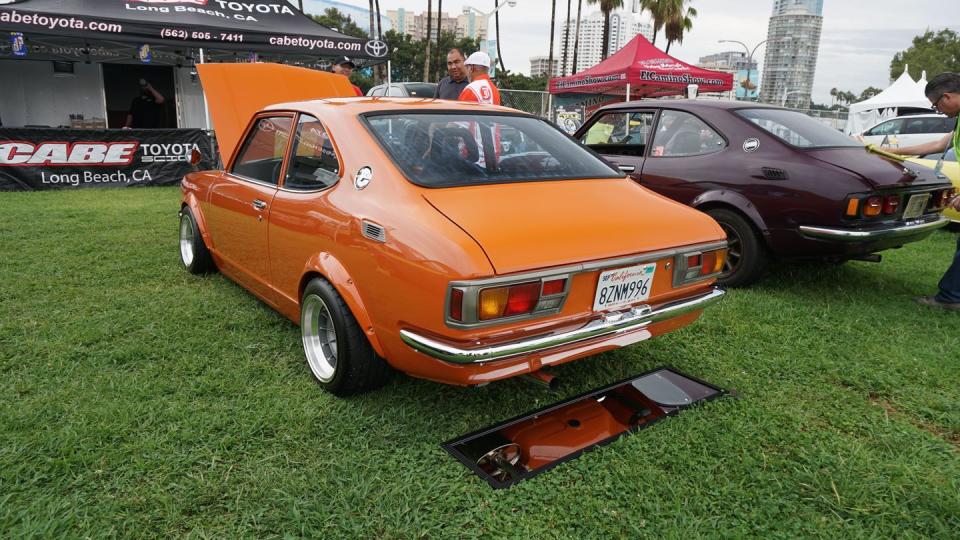
1974 Toyota SR5.
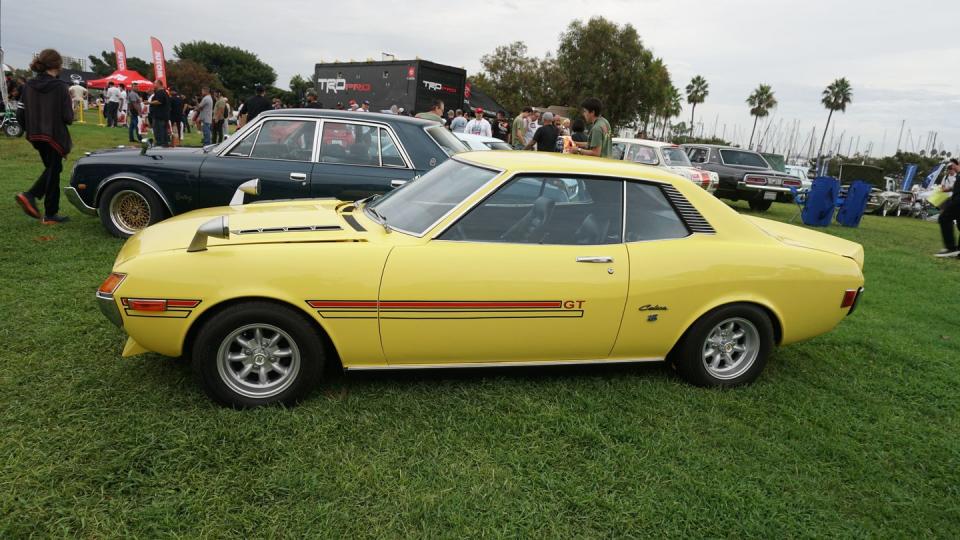
Can you ever have too many pictures of Celicas from the '70s? No.

The famous Toyota Tacozilla made its debut at SEMA.

1977 Toyota Celica.

This might be Brian Karasawa’s 1977 Toyota Celica GT.

1995 Mazda RX-7.

1971 Mazda RX-2.

This 1977 Nissan KenMeri 240K has triple carbs.

There were many Skylines at the show.

Datsun 510

197o Datsun 240Z Works Rally Car was hand-built by Nissan to run in the 1971 Monte Carlo Rally. Its current owner plans to take it back to race spec. He had set up a nice display with many placards about the car. Thank you, owner!

My next guest needs no introduction: The Great Pete Brock. They have now built 200 Aerovaults, the streamlined trailer you see in the back. There is no end to what Brock can do.

The Datsun 220 pickup truck established Datsun in the American market.

Acres and acres of Zs.

Robert Laag inherited this 1974 Datsun PL 620 truck from his great uncle in 1994.

The Nissan Homy was originally sold by Prince before the two companies merged. If they brought this thing into the US market, I swear I'd buy one.

1983 Datsun 200SX.

1990 300ZX: Wing over Long Beach

And finally, a phalanx of 510s.
That’s a lot to see. And there will be more. While we haven’t heard of any plans to have a Japanese car class at Pebble, and while we’ve likewise found no evidence of Japanese car exhibits at institutions like the Savoy, Saratoga, Gilmore museums or the REVS Institute, progress is being made.
Even the esteemed Japanese American National Museum in L.A. will host a car-related exhibit in 2025 or 2026 that will be called Cruising J-Town: Nikkei Car Culture in Southern California.
“Car culture has long been synonymous with Southern California,” the museum says. “What we drive for work and play have been literal and symbolic vehicles of personal expression, community identity, and social mobility. This has been especially true for the Southland’s Japanese American community, starting back over one hundred years ago and continuing through current day.”
The exhibit will feature rare photographs, car-related ephemera, and the oral history testimonies of dozens of Nikkei (Japanese emigrants and their descendants) car enthusiasts, racers, mechanics, journalists, industry professionals, and many others.
The museum is looking for photos to include in the exhibit. If you have some, you can scan and email them to cars@janm.org.
See you at JCCS! Or the LeMay, Audrain, The Pete, or, increasingly, many other venues.

 Yahoo Autos
Yahoo Autos 